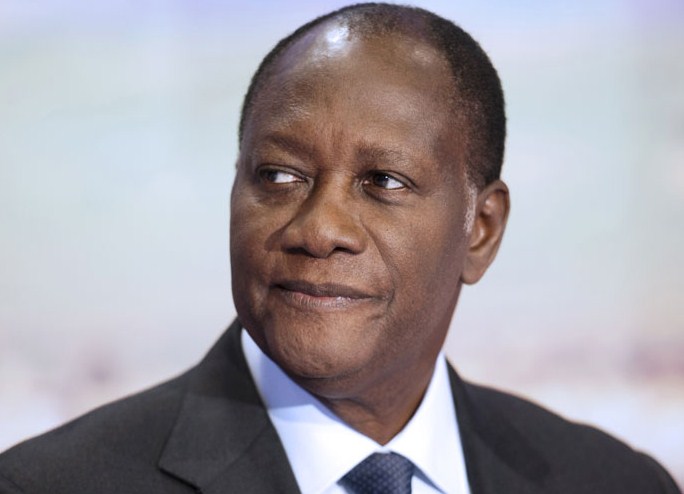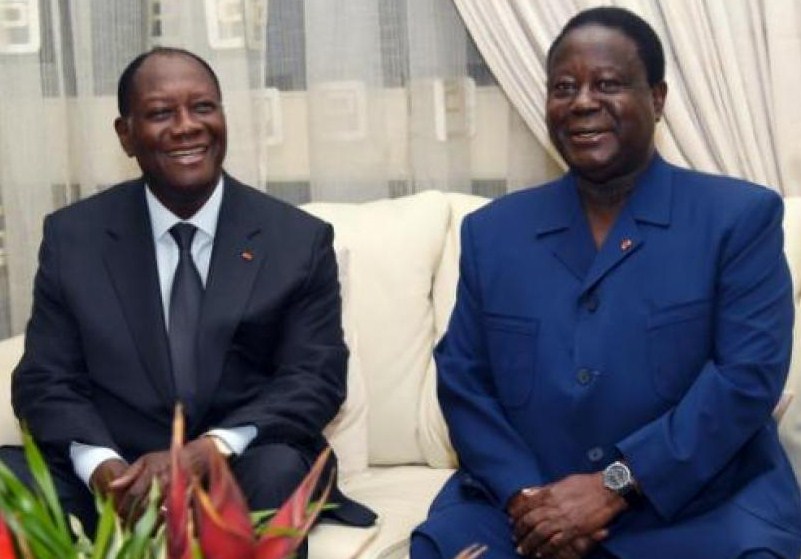President Ouattara’s possible run for a third term spells trouble

BY SOUMANOU SALIFOU
UPDATED ON 4 JULY 2018
On 30 October 2016, Ivorian voters approved a new constitution which reaffirmed the two-term limit of the previous one. So, when President Alassane Ouattara, whose second term expires in 2020, hinted in an interview published by the weekly magazine Jeune Afrique in early June 2018 that he might seek a third term, the remarks sent a shockwave across the political spectrum, making observers at home and overseas fear a repeat of what has been one of the obstacles to Africans’ quest for democracy.
Asked by Jeune Afrique‘s reporter Marwane Ben Yahmed: “Would you run again in 2020?” President Ouattara answered:
“The new constitution allows me two terms from 2020 and on. I will make my final decision only at that time, taking into account the situation prevailing in Cote d’Ivoire. Stability and peace come before anything, including my own principles.”
One of the swiftest and most acrimonious reactions to Ouattara’s remarks came from former Prime Minister Pascal Affi N’Guessan, the leader of one of the wings of the Ivorian Popular Front, former President Laurent Gbagbo’s fractured party:
“Mr. Ouattara has had two terms. I don’t understand how he can contemplate a third or a fourth term. That would even be a flagrant violation of the constitution and the will Ivorians have expressed through the constitution.”
To N’Guessan, no circumstance can justify Ouattara’s run for another term:
“One cannot say that the implementation of the law depends on the circumstance, the situations, or the ambitions of anyone. The law is the law. And he is not the only Ivorian capable of keeping peace and stability in the country, which he has not done.”
The former prime minister fears Ouattara’s staying in power beyond 2020 could, in fact, trigger new violence in the country: “Mr. Ouattara cannot run again. To try that would result in creating instability and clashes again in the country.”
The demons in the rear-view mirror
President Ouattara’s assertion that the new constitution resets the clock for a new beginning of sorts that allows him to run again is nothing new in the African political theater. In 2005, Blaise Compaoré, the then-president of Cote d’Ivoire’s neighbor to the north, Burkina Faso, reached the end of his second seven-year term and was legally required to step down. Instead, he used the exact same justification—though via a ruling by the constitutional council under his order—to remain in power. So he ran again in 2005 and 2010.
But Cote d’Ivoire is a country with totally different sets of circumstances. Blaise Compaoré, who came to power in 1987 in the aftermath of a coup, faced virtually no opposition throughout his entire tenure, in a country that has experienced no wars. To the contrary, Cote d’Ivoire saw the overthrow of a democratically-elected president, Henri Konan Bedie, in December 1999, only to bury hundreds of its citizens slaughtered by the armed forces in support of the bad election of another president, Laurent Gbagbo, a year later. Then the country experienced massive bloodshed in an attempt to overthrow Laurent Gbagbo in 2002 that split the country into two; then a quasi-civil war triggered by Gbagbo’s stubborn refusal to step down after losing the 2010 election to Ouattara, which claimed nearly 3,000 lives. (Despite having ruled Burkina Faso with no real opposition and in peace over a stretch of 27 years from 1987 to 2014, Compaoré could not survive the uprising triggered by his attempt to change the constitution to stand for re-election again in 2015. He was chased from power on 31 October 2014 and fled to neighboring Côte d’Ivoire.)
________________________________________
Benin’s democracy of paradoxes
________________________________________
Tough times in Cote d’Ivoire
President Ouattara has won praises for turning around the economy of Cote d’Ivoire that was ruined under Gbagbo’s turbulent rule, with GDP growth rate over 8% year after year. With the economic engine of the leading member of the 8-nation West African Economic and Monetary Union back on, Abidjan, the largest city, became virtually overnight a vast construction site, with hotels and office buildings popping out of everywhere. Not to mention important infrastructure—roads and bridges—in Abidjan itself and in other regions.
However, the benefits of the economic progress have gone only to the elite. A political analyst interviewed for this article has told “The African,” echoing repeated complaints from “ordinary people” the magazine had talked to, that “the economy looks good only on paper.”
Then, 2017 turned out to be a bad year for the economy, as a result of the drop of the prices of cocoa, of which Cote d’Ivoire was the world’s largest producer. To make matters worse, the civil service was impeded by months-long strikes of civil servants claiming salary increases and benefits, just as the country was shaken by several mutinies that caused real fear for the worse. But this is proving a smooth year.
In this context of socio-economic concerns, the president’s office is eyed not only by the opposition embodied by former prime minister Affi N’Guessan, but also within the ranks of the president’s alliance with the country’s oldest party, Cote d’Ivoire’s Democratic Party (PDCI.)

________________________________________
The amazing journey of the first “African” president of the United States
________________________________________
A political minefield
To win the presidency in 2010 and re-election in 2015, Ouattara’s party, the Rally of the Republicans (RDR), needed—and received—the votes of the members of the PDCI party chaired by former President Henri Konan Bedie. The two politicians, acting under the umbrella of the Rally of the Houphouetists for Democracy and Peace (named in memory of the nation’s founding father, the late president Houphouet-Boigny), are bound by an agreement whereby PDCI would not run against Ouattara in 2015, and the latter’s parry, RDR, would support the PDCI’s candidate for the 2020 election. (In 2015, younger members of Bedie’s party wanted to throw their hats in the race, but Bedie brought the house in order.)
Clearly, another run by Ouattara in 2020 would be a violation of that agreement, and would take the now-deteriorated relation between the two men and their respective parties to a dangerous level. According to some news reports, Bedie himself has already threatened to run against Ouattara if, indeed, the latter chooses to run in 2020.
Guillaume Soro, the speaker of the parliament whose armed forces (dubbed the New Forces) helped Ouattara end Gbagbo’s refusal to step down after losing the election in 2010, is another force to reckon with. Soro, who is reportedly waiting also for his turn to climb on the presidential seat, has not been in the best of terms with his former ally Ouattara lately.
________________________________________
Presidents Ouattara and Soro: has the hatchet been buried?
________________________________________
The economic guru that is President Ouattara needs to also be a political genius to navigate this political minefield if, indeed, he chooses to run again in 2020.
But some political analysts say Ouattara has no real intention of running after 2020. His concern, the analysts say, is to weigh in on who will succeed him as president. The same analysts also say, falsely or rightly, that his one-time ally Guillaune Soro is not one of those he wants to succeed him.


